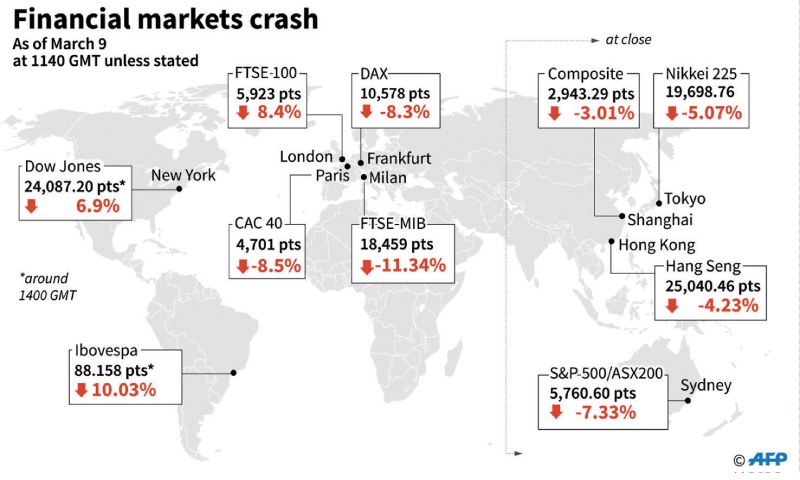Islamabad/New York/Singapore, April 04: Financial markets worldwide tumbled on Thursday as Wall Street led a global sell-off in response to escalating trade tensions initiated by US President Donald Trump.
Despite the market turmoil, the White House maintained confidence that the US economy would emerge stronger.
The Dow Jones Industrial Average suffered a steep decline of more than 3%, while the S&P 500 recorded a drop exceeding 4%.
The Nasdaq Composite experienced the sharpest fall, plunging over 5%.
Wall Street Plunges as Global Markets React to Trump’s Trade War
The shockwaves rippled through financial centers across Asia and Europe following Trump’s announcement on Wednesday.
While some foreign leaders signaled a willingness to negotiate, others threatened retaliatory tariffs in response to the US measures.
Trump imposed a 10% tariff on imports from all countries, with significantly higher duties placed on imports from key trading partners, including China and the European Union.
In addition, a 25% tariff on all foreign-manufactured vehicles took effect, prompting Canada to implement a reciprocal tariff on US imports.
New Tariffs Take Effect
The economic consequences of these tariffs have already begun to surface. Stellantis, the parent company of automotive brands such as Jeep, Chrysler, and Fiat, halted production at certain plants in Canada and Mexico.
Read More: Stocks Down as Tariff War Incites Slump Worry
Despite mounting concerns, Trump dismissed the market downturn, assuring reporters before departing for his Florida golf resort that stock markets would “boom.”
Economic and Political Fallout
Trump has consistently downplayed concerns about a potential global economic downturn and the possibility of domestic price hikes resulting from the tariffs. However, some members of his own party are voicing opposition.
Republican Senator Mitch McConnell openly criticized the tariff strategy, calling it “bad policy.”
He emphasized the importance of collaborating with international allies rather than working against them. “Securing long-term prosperity for American industries and workers requires cooperation, not confrontation,” McConnell stated.
Nevertheless, Trump appears resolute in his approach, viewing tariffs as a tool to pressure trade partners into adopting US-preferred terms.
Oil Prices Tumble
The financial turmoil extended to the energy sector, with oil prices taking a substantial hit.
The Organization of the Petroleum Exporting Countries and its allies (OPEC+) announced an accelerated schedule for easing oil production cuts in May, compounding market concerns following Trump’s sweeping tariff measures.
By 12:50 p.m. EDT (1650 GMT) on Thursday, Brent crude futures had declined by $5.04, or 6.72%, settling at $69.91 per barrel. Meanwhile, US West Texas Intermediate (WTI) crude futures dropped by $5.13, or 7.15%, to $66.58 per barrel.
Also Read: World Food Prices Fell in January: UN Agency
Brent crude was heading toward its largest percentage drop since August 1, 2022, while WTI was set for its worst decline since July 11, 2022.
Market analysts expressed unease over the situation. Phil Flynn, a senior analyst at Price Futures Group, remarked, “There’s a lot of fear and anxiety in the market right now.”
As global economies brace for further trade disruptions, uncertainty looms over the long-term impact of Trump’s tariff policies and the ability of markets to recover from the latest financial shock.
